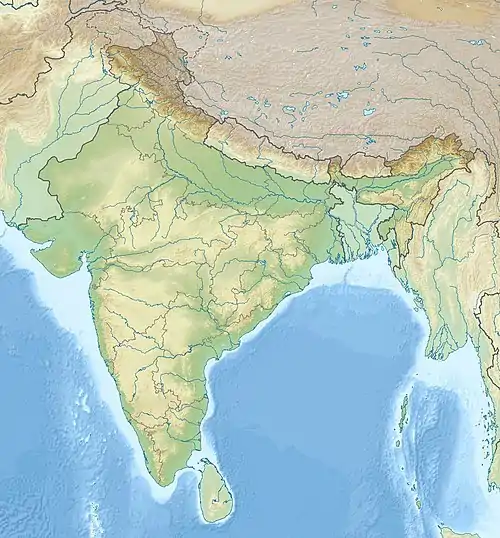Ranganadi Dam
The Ranganadi Dam is a concrete-gravity diversion dam on the Ranganadi River (also known as Panyor River) in Arunachal Pradesh, India which serves a run-of-the-river scheme.
| Ranganadi Dam | |
|---|---|
 Location of Ranganadi Dam in India | |
| Location | Arunachal Pradesh, India |
| Coordinates | 27°20′34″N 93°49′0″E |
| Construction began | 1988 |
| Opening date | 2001 |
| Owner(s) | North Eastern Electric Power Corporation (NEEPCO) |
| Dam and spillways | |
| Type of dam | Concrete gravity, diversion |
| Impounds | Ranganadi River |
| Height | 68 m (223 ft) |
| Length | 339 m (1,112 ft) |
| Spillway type | Service, gate-controlled |
| Reservoir | |
| Creates | Ranganadi Reservoir |
| Dikrong Power House | |
| Coordinates | 27°15′27″N 93°47′32″E |
| Operator(s) | North Eastern Electric Power Corporation (NEEPCO) |
| Commission date | January 2002 |
| Type | Run-of-the-river |
| Turbines | 3 x 135 MW Francis-type |
| Installed capacity | 405 MW |
Power generation
The dam is intended for hydroelectric purposes and is part of Stage I of the Ranganadi Hydro Electric Project and supports the 405-megawatt (543,000 hp) Dikrong Power House. The 68 m (223 ft) tall dam diverts water south into a 10.1 km (6.3 mi) headrace tunnel which is then transferred into a 1,062 m (3,484 ft) penstock before reaching the three 135 megawatts (181,000 hp) turbines.[1] Since commissioning, the power house has been generating much less than its capacity because of drought.[2]
Stage II of the project is designed to provide water storage for Stage I and includes a 134 m (440 ft) rock-fill embankment dam with a 523,000,000 m3 (1.85×1010 cu ft) storage capacity. This dam will support an additional 180 megawatts (240,000 hp) power station.[3]
References
- "Ranganadi Hydro Electric Project Stage I". North Eastern Electric Power Corporation. Retrieved 28 August 2010.
- "Reservoir of dams". India Environmental Portal. May 2008. Archived from the original on 24 January 2010. Retrieved 28 August 2010.
- "Ranganadi Hydro Electric Project Stage II". North Eastern Electric Power Corporation. Retrieved 28 August 2010.
